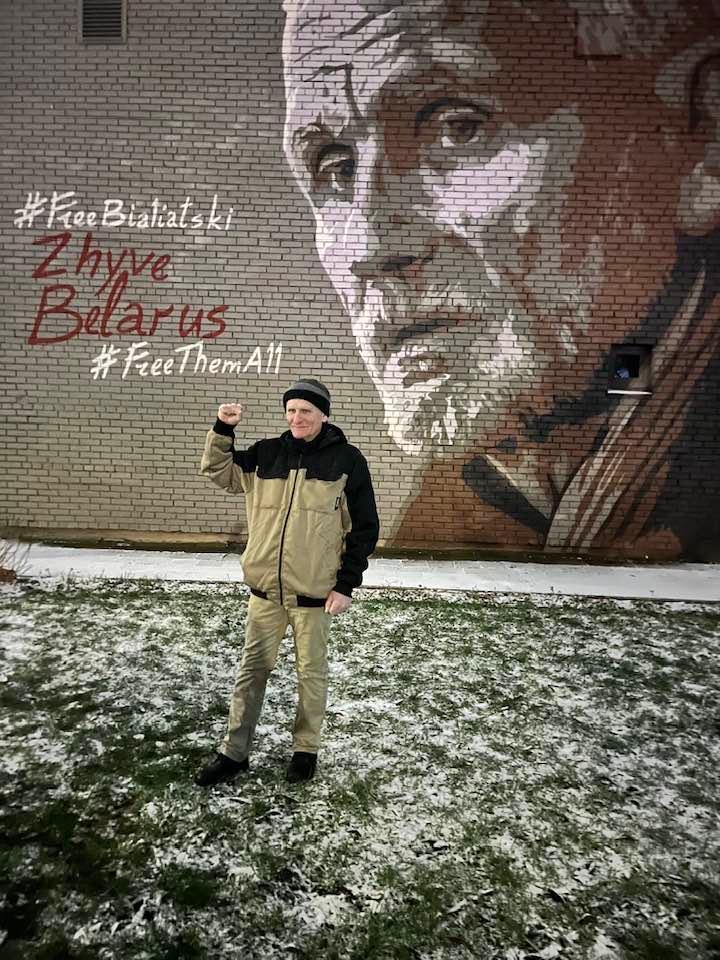Ales Bialiatski: From Student Movement to Nobel Peace Prize
Belarusian-speaking since the age of 19. Youth and student life
Ales Bialiatski was born on September 25, 1962, in the town of Värtsilä, Sortavala district of Karelia — his parents moved there from Belarus to work. Two years later, the family returned to Belarus and settled in Svetlahorsk, Gomel region.
“In those years, I became keen on reading, and I still am. Meanwhile, no one taught me to read. I learned everything myself. At the age of five, I would take the ABC-book and ask my older brother, “What kind of letter is this and what is that?” Then I started reading, and our parents were surprised. Until the fifth grade, I loved to fight, knew no fear and did it successfully, because no one expected a left-hander’s blow. Later I became so fond of books that I started spending more time at home.”
In 1979, Ales Bialiatski entered the history and philology faculty of the Gomel State University, where he began his literary and social activities.
“It was there that we began to think about the issues of the Belarusian language, history, and culture. In general, the fate of Belarus. We began to analyze what state we are in and what the developments might be. It was then that I began to worry about the issues of the Belarusian national distinctiveness, ‘Belarushchyna’.
In 1981, I spent the money earned in a student summer construction team to explore the historical places of Belarus. There were many impressions on the trip. The main one was that the Belarusian language is alive! In contrast to the present time, it was really spoken in villages and towns, almost everywhere.
During that trip, I was lucky enough to visit Mikalaeushchyna, which, as you know, was the home village of Yakub Kolas. It was right about Uncle Yakub’s 100th anniversary, so some artists were working there. Mikola Kupava was the most active one of them. I was impressed by their Belarusian language, and this became the reason for the acquaintance. Mikola asked me, “What’s your name?” I answered, “Sasha”. And Kupava said, “No, your name is not Sasha, it’s Ales”. Thus, at the age of 19, I became Ales. I have been speaking exclusively Belarusian ever since, and I decided then that everything related to that would be the main thing for me for the rest of my life. In fact, that has turned out so.”
Ales recalled that other students willingly spoke Belarusian to them, still they remained bilingual, while Bialiatski used exclusively Belarusian, even at the lectures on Russian literature.
“We became Belarusian definitively and irreversibly. I had an unbridled desire to influence other people, popularize the Belarusian language, and raise the national consciousness. The contacts I established with the conscious Belarusian-speaking students in Minsk, Vintsuk Viachorka and others, encouraged me to naturally promote and follow that path of enlightenment and revival.
It seemed to me then that we, as active atoms, pushing and colliding with other people and giving them our positive Belarusian impulse, would inevitably cause a chain reaction that would lead to the formation of a strong Belarusian conscious intelligentsia, which, in turn, would raise awareness among the broad masses of ordinary people… It was worth spending my life on that”, Bialatski recalled about that period in his book Fight with Oneself, the text of which he mostly wrote during his imprisonment in the Babruisk colony.
In 1981, together with his friends, he founded the Baski (The Basks) student rock band. The Belarusian-centric rock band included three guitars, drums, and a solo voice. Their main hit was a hooligan song with a convincing text, “That’s the only way! Stick to your direction! That’s the only way! This is our salvation! That’s the only way!”.
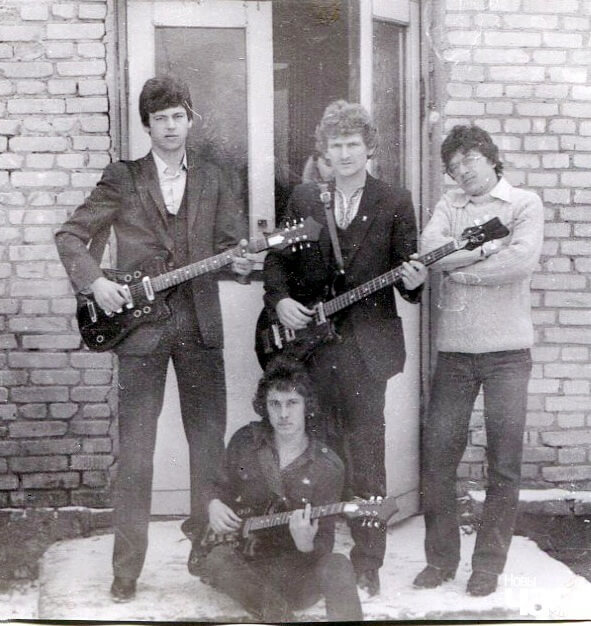
In 1984, Ales received his diploma as a teacher of philology. Before going to the graduate school of the Literature Institute of the BSSR Sciences Academy, he worked as a teacher in the Lelchytsy district of the Gomel region.
First fine for rally. Beginning of social activism
After the compulsory military service, Ales continued his studies in the graduate school and in parallel engaged in scientific, literary, and social activities. In 1986, Bialiatski became one of the founders of the Tuteishyia (The Locals) Young Writers Society. Later he was elected the chairman of the organization.
“All our activities were divided into two parts. The underground part: no more than a dozen like-minded people decided on the strategic areas of activity and on the most effective ways to achieve our goal. They published their works in the Burachok journal.
The second part was legal. That was about the work of the so-called “informal” organizations that united youth by interests. We created one of them, the Tuteishyia Young Writers Society, together with Anatol Sys.
There was a breakpoint of the era then. The former reputative figures fell down, while unreasonably forgotten writers were published, and people began talking about forbidden topics.
On one and the same day, on October 19, 1988, Bialiatski became a co-founder of the first human rights organization Martyrology of Belarus and a member of the Organizational Committee of the Adradzhenne Belarusian National Front. At that time, he was 27 years old.
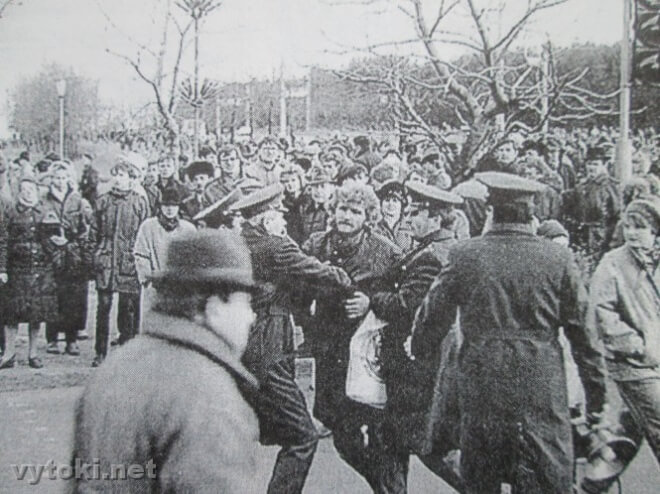
Just a couple of weeks later, on October 30, 1988, the legendary Dziady march took place in Minsk. It was the first mass action in Belarus, and Bialiatski had filed an application with the authorities to hold it. He was detained as the march organizer and fined 200 Soviet rubles.
“We decided to hold the rally, although the authorities repeatedly urged the public not to take part in it. They even tried to intimidate people. That provoked the opposite reaction. To our surprise, thousands of people came to Dziady-1988.
The authorities had been preparing to disperse and dismiss the rally. Later, I got access to a document with instructions on what they had been going to do. One group was to neutralize the leaders, the other group was to capture the sound equipment, etc. They acted according to that scenario. I was arrested immediately. It must be said it was very unexpected for them that the rally gained broad public attention. The society was outraged, and people began to think about what was happening around and what should be done. Considering that the Organizational Committee of the Belarusian National Front was created just a month before, that event brought thousands of supporters to the new movement. Democratic changes in Belarus happened very rapidly. No one could have foreseen that. The youthful dream about the country’s independence became a reality”.
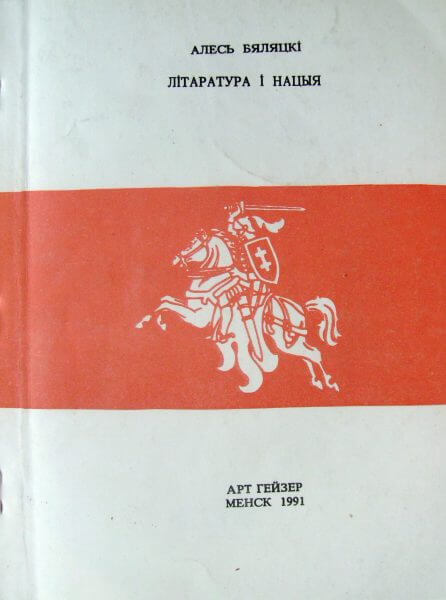
In the spring of 1989, Bialiatsky graduated from the Literature Institute of the BSSR Sciences Academy, but refused to defend his science candidate’s thesis. In 1991, he published his first book ”Literature and Nation” based on that thesis.
Museum as a national platform. Working at museum
In 1989, Ales started working at the Museum of the History of the Belarusian Literature as a junior researcher. Later, he was elected the director of the Maksim Bahdanovich Literary Museum. He worked in that position until August 1998.
“There was a wave of elections in the Soviet Union (from the very top), the heads of various enterprises and institutions were elected. Soon, such an election was announced in the nearby museum of Maksim Bahdanovich.
I was working as a junior researcher and decided to take part in it. There were four candidates, but everyone voted for me. That was what the museum collective decided. It must be noted that that caused a misunderstanding in the Ministry of Culture, to put it mildly. They knew my previous biography well there. There was no approval for a month, and then the Minister of Culture Yauhen Vaitovich gave up, “Appoint him”.”
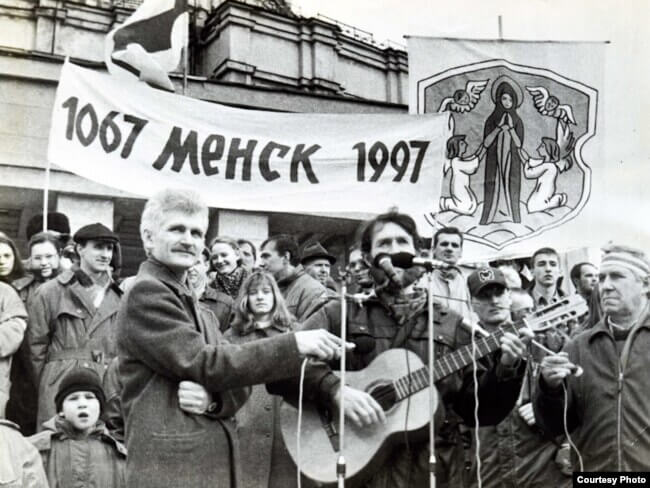
Under the leadership of Ales Bialiatski, the preparation of the Belarusian Khatka (Belarusian Village House) exhibition and the exposition of the central Maksim Bahdanovich Literary Museum in Minsk was completed. He actively participated in the events dedicated to the 100th anniversary of Bahdanovich, which were held in Belarus, Ukraine, and Russia. Ales initiated publishing archival collections dedicated to the publication of materials related to the life of Bahdanovich, his relatives and acquaintances, and the publication of the memoirs of the poet’s father, Adam Bahdanovich.
“While working at the museum, I did not particularly hold on to the directorship. I considered the museum as a national platform, and not just a repository of dead things. Therefore, for more than a year, the museum located both the Svaboda and Nasha Niva media, hosted meetings of the Belarusian National Front’s Board and Council, celebrations of the Uniate Church Christmas, gatherings of the Belarusian Catholic community. Dozens of non-governmental organizations were registered there. In a word, the museum was filled with contemporary Belarusian life.”
In 2021, in the pre-trial detention center, Ales Bialatski started writing his memoirs about the Maksim Bahdanovich Museum.
On December 8, 2021, behind bars, Ales also celebrated the 30th anniversary of the opening of the museum exposition.
“They have just celebrated the 130th anniversary of Maksim Bahdanovich. Throughout this November and December, I recalled how 30 years ago we opened the museum of Maksim Bahdanovich in Trayetskaye pradmestse (Trinity Hill). Throughout the two years before the opening, my colleagues and I worked tirelessly. What a pleasure and joy it was when the museum opened its doors to visitors. The state Belarusian TV channel showed a short story about the museum — it was nice to watch. As they say, “There were times, there was an era”. 30 years is an incredible number. That’s how life passes,” Ales wrote in his letters about that important date.
In 1991, Ales Bialiatski was nominated as a candidate for People’s Deputies by the collective of the Maksim Bahdanovich Museum and the Spadchyna (The Heritage) journal.
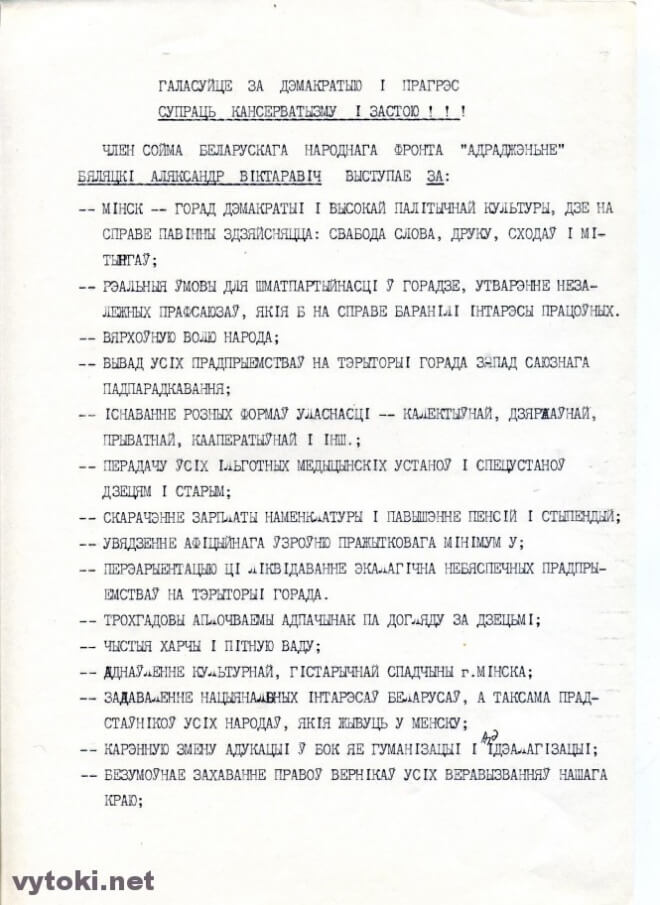
Ales was a deputy at the Minsk City Council of Deputies in 1991-1996.
Human rights activities in Viasna
In 1996, the authorities brutally dispersed thousands of participants in the Chernobyl March and detained more than 200 people. Then social activists united to help the detainees and their families. Thus, the Viasna-96 human rights initiative was born, which was later reformed into the Viasna Human Rights Center, with its branches in several cities of Belarus. Its founder, Ales Bialiatski, remains the chairman of the organization to this day.
“For the first two years, I worked at Viasna in parallel with my work at the museum. Then I had to leave the museum, and my literature and museum biographies completely turned into a human rights defender’s one.
To be honest, when the organization was created, I did not think that it would last that long. I thought that in 2-3 (maximum 5) years there would be no need for it at all, and we would return to our usual work — museological, literary, scientific, political. Unfortunately, I was wrong,” Ales Bialiatski recalled.
Meanwhile, after observing the presidential elections in 2001, the pressure on human rights defenders increased. In 2003, the Supreme Court deprived Viasna of its state registration – in fact, it meant liquidation of the organization.
In 2007, the UN Human Rights Committee recognized the liquidation of the Viasna Human Rights Center as a violation of the freedom of association of the organization members, and recommended the reinstatement of Ales Bialiatski and his colleagues.
In 2007, and then twice in 2009, Viasna made unsuccessful attempts to obtain official registration from the Ministry of Justice. Then the human rights defenders announced that they would continue their peaceful human rights activities without the registration.
In 2007, Ales Bialiatski was elected the vice-president of the International Federation for Human Rights (FIDH).
First criminal prosecution
Throughout the existence of Viasna, the authorities more than once put pressure on human rights defenders for their activities in defense of rights and their help to people. Ales always actively supported the repressed Belarusians, for which he was detained under criminal charges. On August 4, 2011, Ales Bialiatski was arrested on charges of ‘concealing profits in a particularly large amount’ (Part 2, Article 243 of the Criminal Code). The Ministry of Justice of Lithuania and the Prosecutor General’s Office of Poland disclosed information about the human rights defender’s accounts in foreign banks to the Belarusian authorities. These accounts accumulated financial aid for victims repressed by the Belarusian authorities.
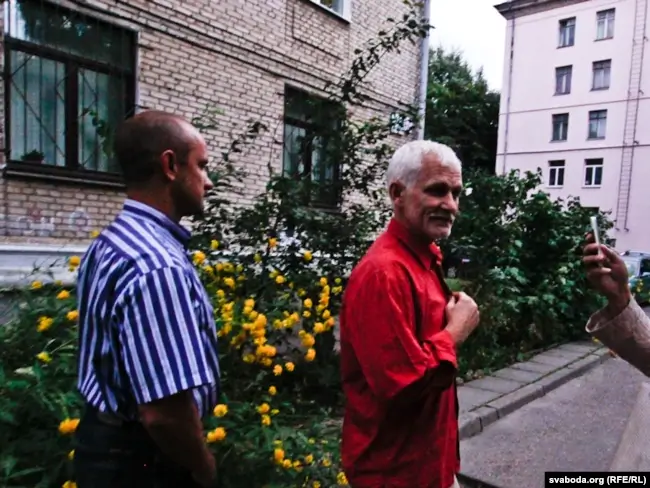
On November 24, 2011, the Pershamaiski District Court of Minsk sentenced Ales Bialiatski to 4.5 years of imprisonment in a high security colony, with confiscation of his property. Ales did not admit his guilt, saying that all the money from the accounts had been spent on human rights activities and helping people.
“I have been engaged in human rights activities, and public activities in general, for almost all my life. This year marks 30 years since I was first engaged in public activities. The years from 1991 to 1995 were the period when I felt more or less calm and free. In such a bad situation, which has been developing in the country for all the last years, criminal prosecution could naturally be expected any minute, any year — and it happened. Therefore, I do not regret any of my steps taken over these 30 years in terms of the protection of democracy and human rights in Belarus. I was doing that consciously,” said the human rights defender in his last words in court.
The European Union and the USA, major international human rights organizations, and leaders of the Belarusian opposition political parties condemned the apparently politically motivated decision. The Ministry of Foreign Affairs of Belarus negatively assessed the reaction of the Western countries to the verdict. Bialiatski was sent to the Babruisk colony #2 to serve his term.
On November 23, 2012, the UN Working Group on Arbitrary Detention published their decision stating that the imprisonment of Ales Bialiatski contradicted Article 22 of the International Covenant on Civil and Political Rights (the right to freedom of association).
Decision of UNHRC on Ales Bialiatski’s case
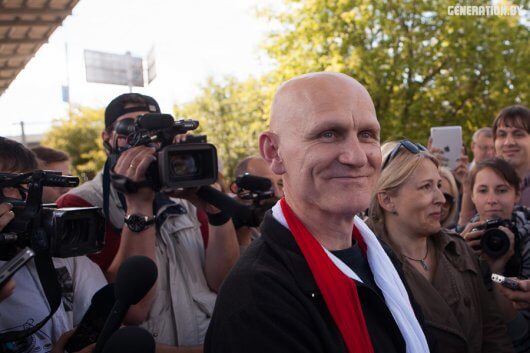
On June 21, 2014, Ales Bialiatski was granted amnesty. He had spent 1052 days in prison. Ales returned to human rights activities and his duties as the Viasna chairman, despite the fact that he was still threatened with persecution in Belarus.
Four books written behind bars. Literary activity
In total, Ales Bialiatski published about ten books, many of the materials for which he wrote during his imprisonment. In his books, he reflects on the events of his personal and social life, the people around him, his travels, the history and literature of Belarus, and his condition in prison. In 2016, the human rights defender wrote the book “Fight with Oneself” — a creative portrait of the poet Eduard Akulin. The first three chapters of this book were written in the Babruisk colony. He also published the essay “If God is with us, then who is against us?” about the trip to Krakow on the occasion of the 25th anniversary of the Polish trade union Solidarność.
Ales Bialiatski’s books (four of them written behind bars):
- Jogging on Lake Geneva Shores (2006)
- Enlightened by ‘Belarushchyna’ (2012)
- Mercurial Silver of Life (2014)
- Cold Wing of Motherland (2014)
- Prison Notebooks (2018)
Ales Bialiatski was awarded with literary prizes: the Norwegian Authors Union Freedom of Expression Prize (2011), and the Frantsishak Aliakhnovich Prize for the book Mercurial Silver of Life. Prologue: Notes of Human Rights Defender (2014).
Second criminal prosecution after events of 2020
In 2020, the largest mass protests in history took place in Belarus — people protested against the falsification of the results of the presidential elections. Viasna observed the elections as part of their campaign Human Rights Defenders for Free Elections, and helped victims of repression. The reaction of the authorities to the unwanted human rights activities was quite expected.
On February 16, 2021, the first major attack on representatives of NGOs took place throughout Belarus, including human rights defenders of Viasna. In the early morning, law enforcement officers searched the Minsk office of Viasna at 78A Nezalezhnasti Ave., in the presence of Ales Bialiatsky.Besides, searches took place in the regional branches of Viasna in Mahiliou, Rechitsa, Mazyr, and Brest.
The Investigation Committee commented then on the massive attack on civil society activists, “As part of the preliminary investigation, in order to establish the circumstances of the financing of protest activities, the investigation initiated searches at the organizations that position themselves as human rights defenders”.
Many human rights defenders and activists had their office equipment items confiscated, and they have not been returned to this day. Later, the investigators began to summon members and volunteers of the organization for questioning on “the facts of funding of actions that grossly violate public order”. The state claimed that the assistance provided by Ales and human rights defenders of Viasna to the victims of the authorities’ actions encouraged people to participate in the protests.
The Human Rights Center Viasna issued a statement regarding the initiated criminal case:
“In the current situation of acute human rights crisis, the activities of the Human Rights Center Viasna are aimed at helping victims of political repression and pervasive human rights violations. To this end, we actively cooperate with international human rights mechanisms, including within international organizations, the OSCE and the United Nations among others.
We consider the criminal prosecution of the Human Rights Center Viasna as another act of repression in connection with our human rights activities. The persecution is orchestrated by the current authoritarian political regime of Aliaksandr Lukashenka against the background of unprecedented nationwide repression.”
On April 7, 2021, the Investigative Committee summoned Ales Bialiatski as a witness for questioning on the Viasna case for the first time. However, the interrogation failed to take place, since the human rights defender demanded questioning and recording in Belarusian. As a result, the interrogation was postponed to another day.
“Some of the commentators regarded the postponement of the interrogation as a victory, saying that Bialiatsky had taught a lesson to the Investigative Committee. In fact, I do not view this as a victory at all. I did not set that as my goal. Joking with the Investigative Committee today is the same as teasing a viper.
But I won in another way — I defended my right to remain myself in this nervous and chaotic situation. The unusual situation for the Investigative Committee was a common thing for me. The Belarusian language for me is not exotic and not an entourage. The situation itself emphasized once again the poor state of the Belarusian language today,” he wrote in his blog.
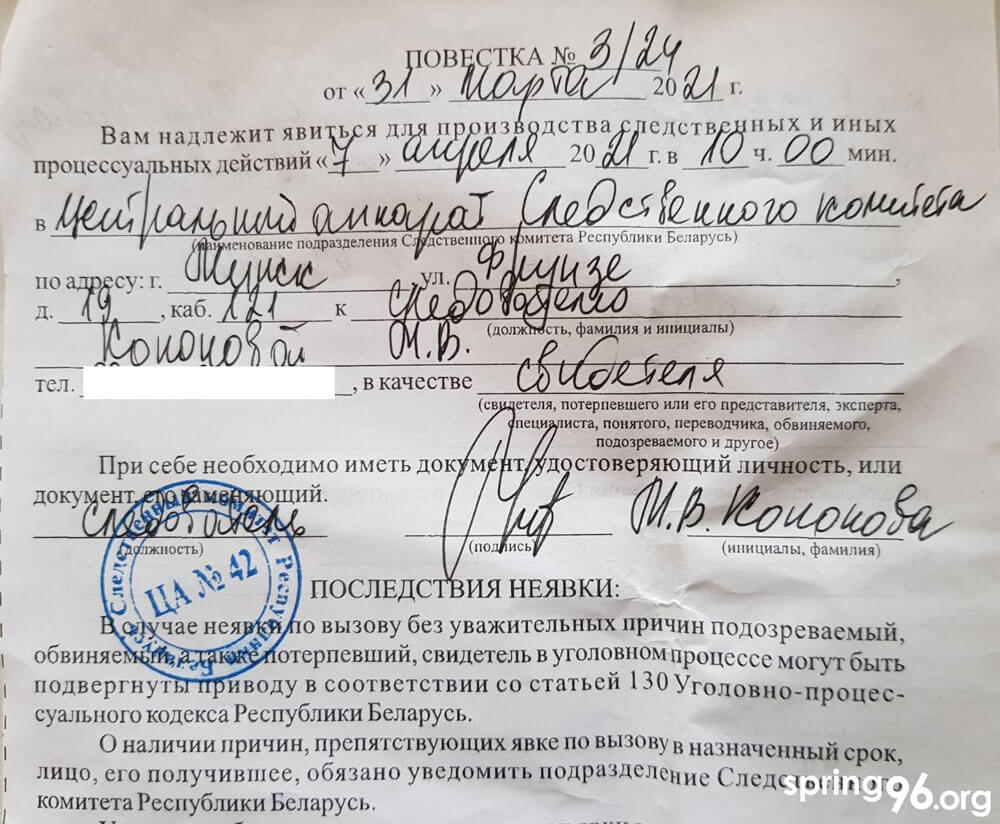
The next interrogation lasted four hours and was conducted entirely in Belarusian.
In the film by Radio Svaboda (RFE/RL Belarus), Ales answered the journalists’ question about what Belarusians should do if human rights defenders are suddenly imprisoned:
“What struck me and what brought me great satisfaction was what we saw after information about tortures reached the Belarusian society. And the Belarusian society, these hundreds of thousands of demonstrations, demanded everything that Belarusian human rights defenders have always demanded. Fair elections, punishment of those who committed crimes, release of all political prisoners — this is our mission, these are our strategic slogans, this is what we have always strived for. It is very important to understand that, in our situation, our rights can only be protected by the entire Belarusian society, not individual human rights defenders or journalists.
Indeed, we can be severely repressed, we can be buried in prisons, expelled from the country, but in this situation only millions of Belarusians can protect their rights. Therefore, it is very important that this desire and persistent demand for the fulfillment of the rights that concern every citizen, this request and pressure come from the entire Belarusian society.”
Another crackdown on civil society took place on July 14, 2021 – that day was referred to as “the black Wednesday”. Eleven members of Viasna were detained then. Ales Bialiatski, Valiantsin Stefanovich, and Uladzimir Labkovich were left in custody and transferred to the Pre-trial Detention Center #1 in Minsk, known as ‘Valadarka’.
The details of the arrest of the Viasna chairman are still unknown, as he was alone at that time. On the morning of July 14, he simply stopped responding to his colleagues, which is very unlike him. Only at 6:00 p.m. the Viasna members learned that Ales had been arrested under criminal charges. It is known that his house was searched, but the law enforcement officers did not even leave a relevant order. The office of Viasna in Minsk on Miarzhynskaha Street, where Bialiatski’s workplace was, is sealed.
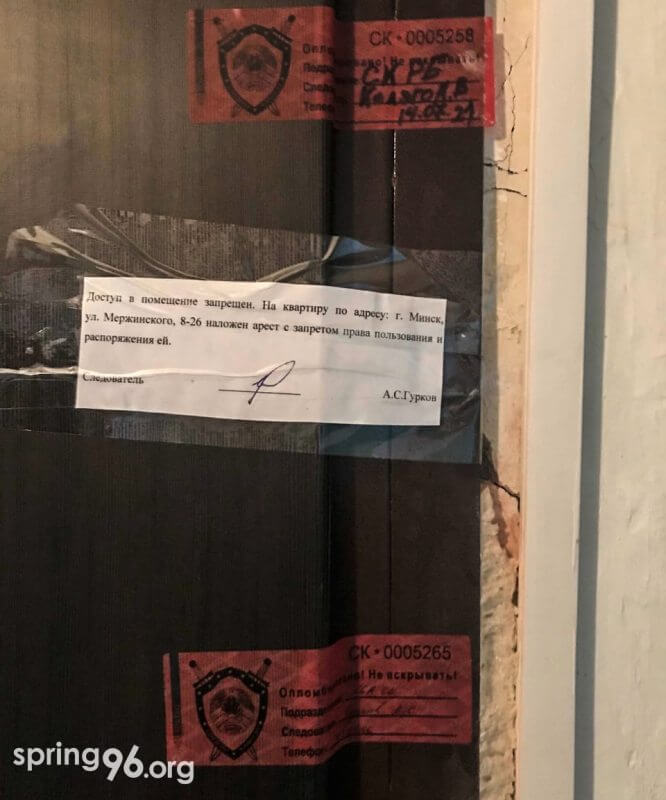
The investigation of the criminal case against the Viasna members is being conducted as secretly as possible. For a long time, the colleagues and relatives of Ales did not even know what criminal article he was accused of.
On October 6, 2021, it became known, from the court schedule of the trial of Ales Bialiatski’s complaint against the extension of his detention term, that the human rights defender was charged under Part 2 of Art. 243 of the Criminal Code (‘tax evasion’). The court left his appeal without satisfaction, as well as all the subsequent complaints.
The main claim of the state against the human rights defenders is that they did not register the Human Rights Center Viasna. Based on that, the authorities concluded that they evaded recognizing the organization as a tax agent and fulfilling its duties.
On September 26, 2022, it became known that the criminal case against Ales Bialiatski and other human rights defenders of Viasna under Part 2 of Art. 243 of the Criminal Code (‘tax evasion’) was terminated. Meanwhile, the three human rights defenders were not released from custody — they were charged with smuggling (‘illegal movement of a large amount of cash across the customs border of the Eurasian Economic Union by an organized group’) under Part 4 of Art. 228 of the Criminal Code, and ‘financing of group actions that grossly violate public order’ under Part 2 of Art. 342 of the Criminal Code. It is known that the claims of the state refer to the same amount of money that appeared in the charges of tax evasion. These three political prisoners, including Ales Bialiatski, now face from 7 to 12 years in prison.
On November 28, it became known that the Prosecutor General’s Office sent the Viasna case to the court. The trial date has not yet been set.
Imprisonment
Relatives and colleagues have almost no information about the case progress and investigative actions involving Ales Bialiatski, as the lawyers are under a non-disclosure agreement. They rarely receive letters from him.
“There is little news, as the days flow monotonously, from morning roll call to evening roll call, from rouse to lights out, from breakfast to dinner, from dinner to supper. As if nothing happens, but it is impossible to describe everything. In general, I have the same feeling as in the title of Alexandre Dumas’ “Ten Years Later” novel,” — Ales Bialiatski wrote in November 2021.
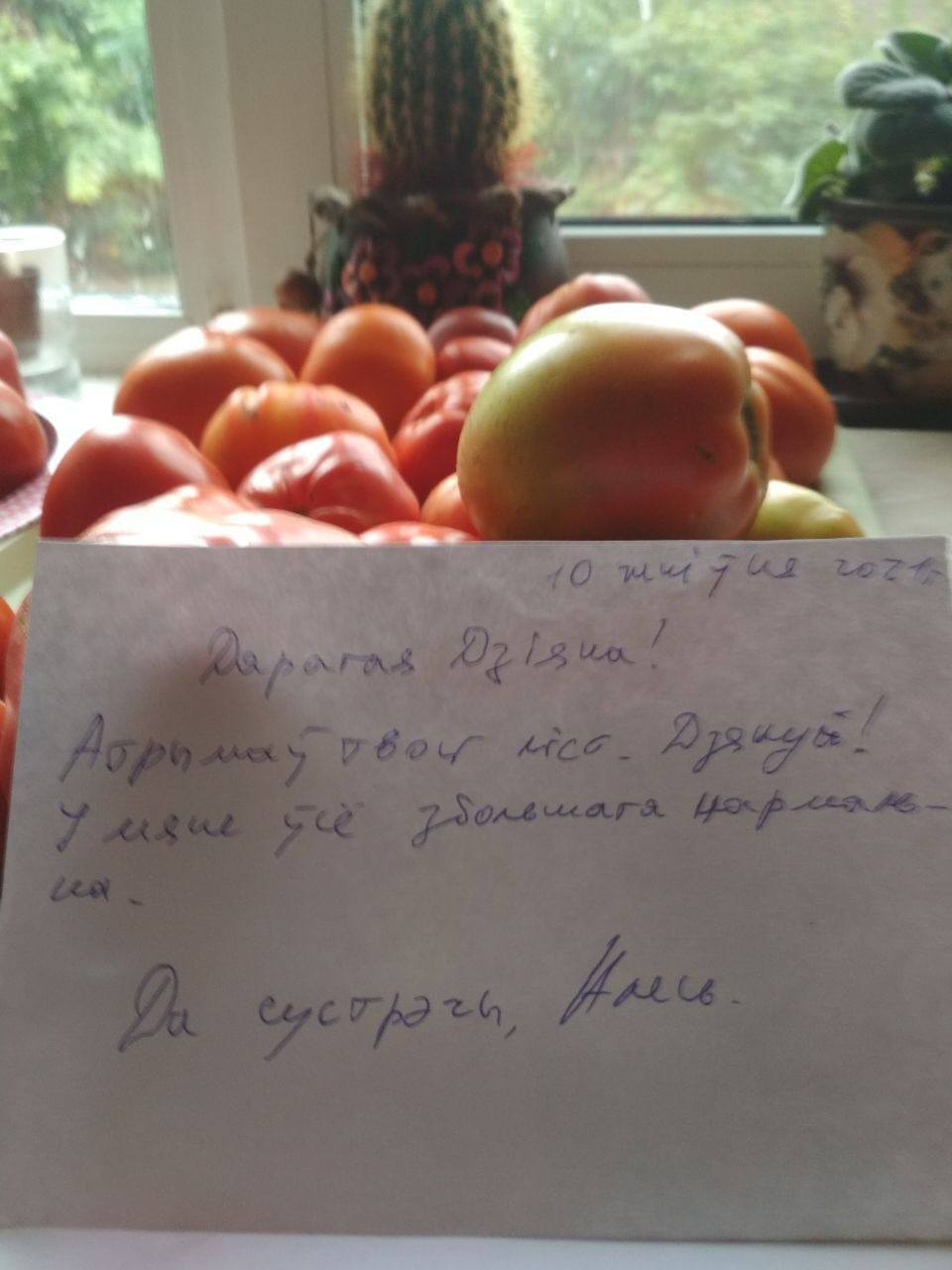
Behind bars, the health condition of Ales has deteriorated — a typical and frequent problem among the Belarusian political prisoners. In the sixth month of his imprisonment, his wife said that his handwriting had changed. Once she even thought that a letter was not from her husband. She explains this by the fact that his eyesight has deteriorated.
“This is caused by the circumstances and conditions, and all the difficulties that Ales is facing now,” she said.
As human rights defenders learned at the end of August 2021, Ales Bialiatski was placed in the so-called “special corridor” in the Pre-trial Detention Center #1 — a semi-basement room with poor conditions.
Solidarity after the second arrest
The arrest of Ales Bialiatski and the repression against the Viasna human rights defenders caused a great wave of indignation both inside the country and abroad.
The day after the detention, human rights organizations of Belarus issued a statement recognising the detained members of Viasna Ales Bialiatski, Valiantsin Stefanovich and Uladzimir Labkovich as political prisoners.
Soon, 161 human rights organizations from all over the world demanded an end to the repression against the Viasna Human Rights Center, and the release of human rights defenders and volunteers.
The Vice-President of the European Parliament Nicola Beer joined Libereco’s solidarity campaign #WeStandBYyou in support of the chairman of Viasna Ales Bialiatski.
“I am honored to take on, again, responsibility. Responsibility as a godparent for one of the hundreds of political prisoners in Belarus. Ales Bialiatski is an honored man. He has been nominated for the Nobel Peace Prize several times for protecting human rights and fundamental freedoms with non-violent activities. For doing this, he is now in pre-trial detention and faces trumped-up charges. […]
I am wholeheartedly supporting the release of Ales Bialiatski, because I know what an outstanding service you render to the Belarusian society. […] I demand here and now from Mr. Lukashenka and the Belarusian authorities to stop the criminal prosecution, to stop the repression and immediately release all political prisoners, amongst them Ales Bialiatski».
On September 17, 2021, the international campaign #FreeViasna was launched for the release of the Viasna human rights defenders. Hundreds of activists and sympathizing citizens took part in support actions in many cities of different countries and expressed solidarity with the human rights defenders.
On November 24, 2021, in her speech in the European Parliament, the leader of the democratic forces of Belarus, Sviatlana Tsikhanovskaya , mentioned the chairman of Viasna, Ales Bialiatski. One year later, in her speech in the European Parliament, she mentioned Ales Bialiatski again and said that the human rights defender learned about his Nobel Prize in a prison cell. And two years ago, he was awarded the Sakharov Prize in the European Parliament.
“In every speech, in every statement, he repeated: “Do not forget about Belarus. Do not forget about our political prisoners.” Since then, the number of political prisoners in Belarus has increased tenfold. Now, 1,350 political prisoners are kept in inhumane conditions, and this number is growing every day. Ales is one of them.”
On November 27, 2021, PEN International called for the release of human rights defender and writer Ales Bialiatski.
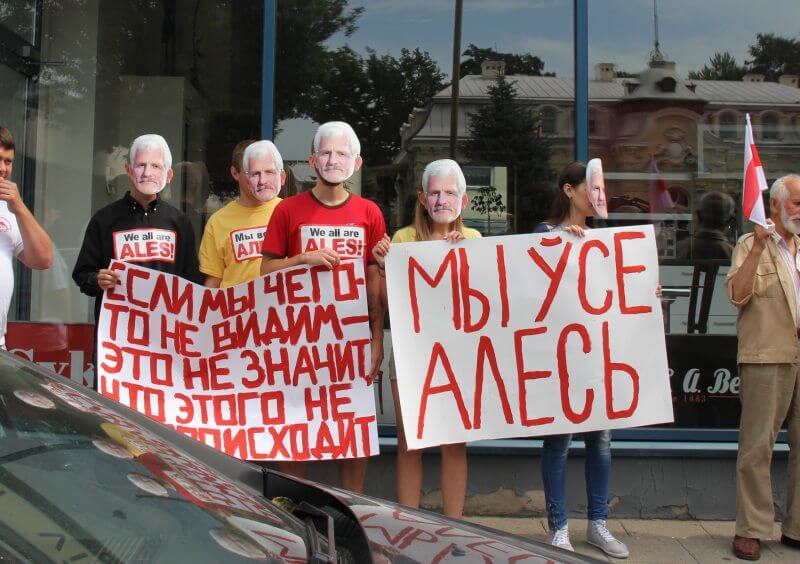
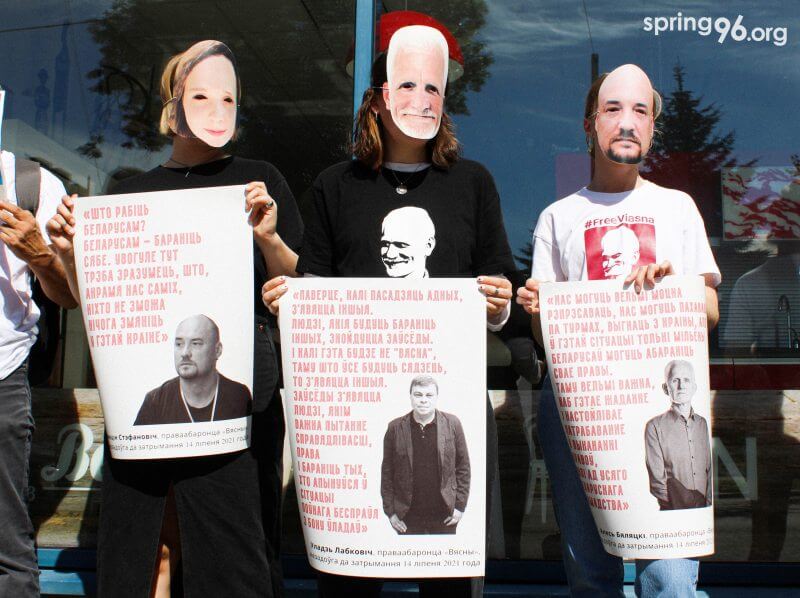
On August 4, 2022, human rights defenders renewed the Day of Solidarity with the civil society of Belarus — on that day11 years ago, the head and founder of Viasna Ales Bialiatski was arrested. The Viasna activists held a solidarity rally near the Embassy of Belarus in Vilnius, Lithuania. The venue and date were not chosen by chance: in 2013, the first action of this kind was held near the Belarusian embassy in Vilnius to express solidarity with the imprisoned chairman of Viasna Ales Bialiatski. The action participants were wearing masks with his portrait then. Now, when Ales Bialiatski is behind bars again, his colleagues again come out to protest.
Awards
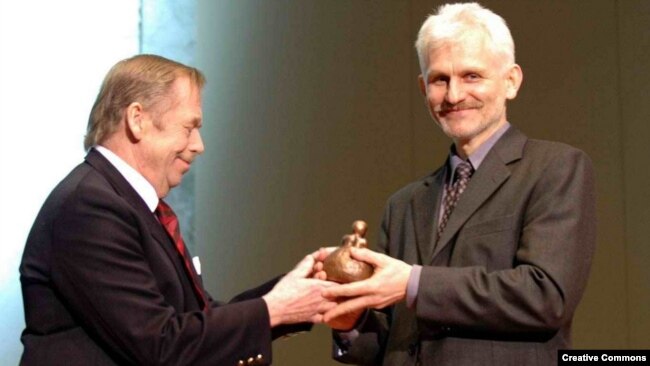
Ales Bialiatski’s courageous, consistent, and principled position in defense of human rights in Belarus and throughout the world was rewarded by many international awards. In 2006, he received the Swedish Per Anger Prize, the Sakharov Prize for Freedom of Thought, the Homo Homini Award, which was presented to him by Vaclav Havel. In 2011, Ales was presented with the diploma For Courage and Struggle for Freedom, and the Best Human Rights Defender of the Year award. In 2012, he received the US State Department Award, the Lech Walesa Award, the Petra Kelly Prize in recognition of his activities in the defense of human rights in Belarus. In 2013, he was given the Vaclav Havel Award from the PACE, and in 2019 it was the award For Human Rights and Rule of Law. Ales was nominated for the Nobel Peace Prize five times.
Ales Bialiatski became an honorary citizen of three cities — Paris (France) and Genoa and Syracuse (Italy).
In 2020, the chairman of Viasna Ales Bialiatski and his organization became the first Belarusian laureates of the prestigious international Right Livelihood Award, known as the Alternative Nobel Prize. Ales Bialiatski and Viasna received the award for their role in the struggle for democracy and human rights in Belarus.
In 2020, the laureates of the Sakharov Prize for Freedom of Thought included the democratic opposition of Belarus, represented by the Coordination Council, the brave Belarusian women, and politicians and civil society figures — ten famous people, including Ales Bialiatski.
“The presentation of the prize of the European Parliament to the broad Belarusian democratic opposition is a recognition of the merits of the entire Belarusian people, who are desperately fighting today for democratic changes in Belarus.
I regard the fact that my name is on the list of the laureates as a gesture of support for our civil society, Belarusian human rights defenders, and my friends from the Viasna Human Rights Center,” — Ales Bialiatski said about the award.
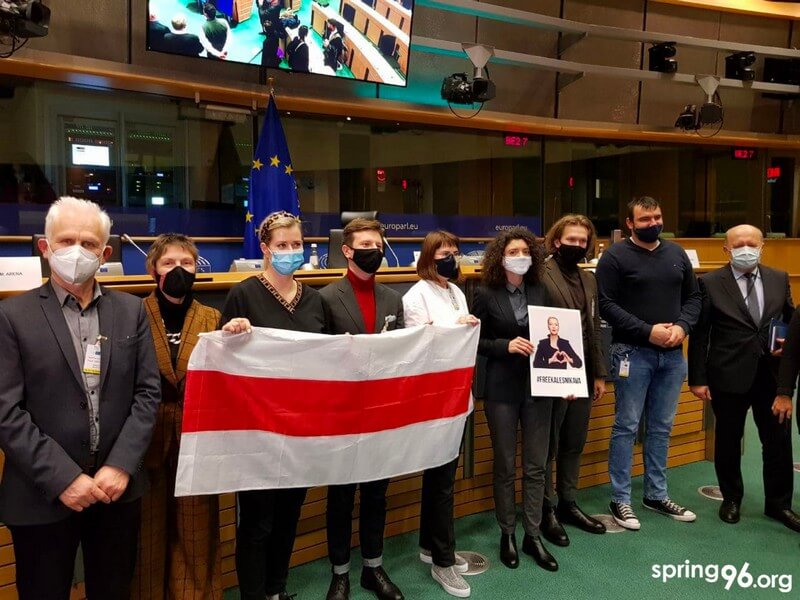
In the autumn of 2022, the Human Rights Center Viasna received the Albie Awards 2022, founded by the Clooney Foundation for Justice, in the nomination Justice for Democracy Advocates.
“The human rights group has been the voice of resistance in Belarus for nearly 30 years as it has led a brave campaign for freedom and democracy against president Lukashenka’s regime. In the run-up to and following the fraudulent 2020 presidential elections, the group has paid a high price for the work; seven Viasna members have been detained on trumped-up charges and both of the organization’s leaders are in jail,” the organizers said.
“These are people that willingly go to prison because they believe so strongly in the fight for independence, in the fight for democracy. They are real heroes,” George Clooney said on CBS before the award ceremony.
On 19 September 2023, Warsaw hosted the Złoty Laur – 2023 award ceremony, which recognizes individuals, institutions, and companies for their exceptional social and cultural activities.
The winner in the Personality of the Year nomination was Ales Bialiatski, a Belarusian human rights activist, founder of the Viasna Human Rights Center, winner of the Nobel Peace Prize, who was sentenced to 10 years in prison.
On 27 September 2023, the Distinguished Alumni Award of the George Marshall Center was presented in Garmisch-Partenkirchen, Germany. The first winner of the prize established this year was political prisoner human rights activist of Viasna Ales Bialiatski, who was a student of the Center in 2000.
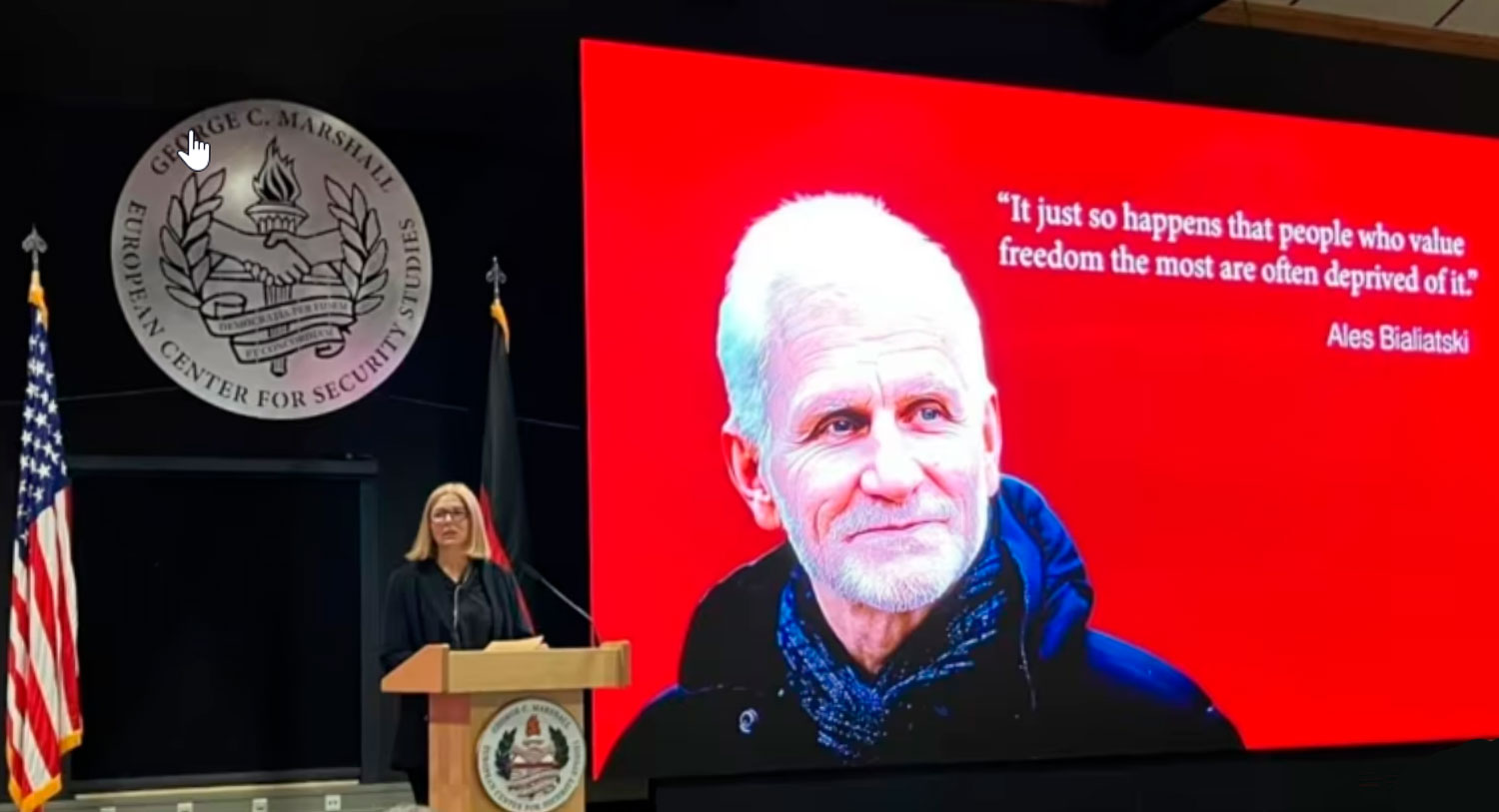
Ales was represented at the ceremony by his wife Natallia Pinchuk. In her speech, she expressed gratitude to the leadership of the Marshal Center for this act of solidarity with Ales Bialiatski, and through him with all political prisoners of Belarus, with all the Belarusian people who long for liberation from the dictatorship.
Nobel Peace Prize
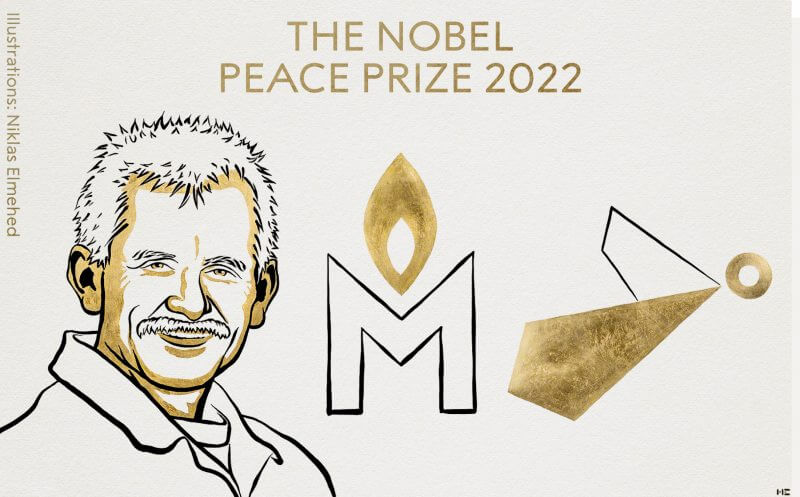
In 2022, the Nobel Peace Prize laureates are the chairman of the Human Rights Center Viasna Ales Bialiatski, the Ukrainian Center for Civil Liberties, and the Russian Memorial human rights group. The Nobel Committee informed about that on October 7, 2022.
This year, Ales Bialiatski was nominated for the Nobel Peace Prize for the sixth time. He became the third person to receive the Nobel Peace Prize while in prison or in custody.
“The Peace Prize laureates represent civil society in their home countries,” the chair of the Norwegian Nobel Committee said. “They have for many years promoted the right to criticize power and protect the fundamental rights of citizens. They have made an outstanding effort to document war crimes, human rights abuses and the abuse of power.”
The Committee noted that Ales Bialiatski was one of the initiators of the democracy movement that emerged in Belarus in the mid-1980s. He has devoted his life to promoting democracy and peaceful development in his home country.
“Government authorities have repeatedly sought to silence Ales Bialiatski,” the Nobel Committee emphasizes. “Since 2020, he is still detained without trial. Despite tremendous personal hardship, Mr Bialiatski has not yielded an inch in his fight for human rights and democracy in Belarus.”
It is known that Ales quickly learned about the award, but his reaction regarding the decision of the Nobel Committee is still unknown.
On October 10, 2022, the UN experts called for the immediate release of the Nobel laureate Ales Bialiatski and other human rights defenders in Belarus.
“There is a serious accountability gap for gross violations of human rights law in Belarus, and we welcome the solidarity of the international community and all efforts based on international law to persist in seeking justice,” the experts said.
Many well-known figures spoke about the award to the Belarusian human rights defender.For example, the American President Joe Biden said:
“This year’s Nobel Peace Prize winners remind us that, even in dark days of war, in the face of intimidation and oppression, the common human desire for rights and dignity cannot be extinguished. <…>
For years, they have tirelessly fought for human rights and fundamental freedoms—including the right to speak freely and criticize openly. They have pursued their mission with passion and persistence. <…> Ales Bialiatski has never backed down from demanding the democratic freedoms the Belarusian people deserve, even while imprisoned. <…>
Above all, the brave souls who do this work have pursued the truth and documented for the world the political repression of their fellow citizens—speaking out, standing up, and staying the course while being threatened by those who seek their silence. In doing so, they have made our world stronger.’
The Nobel Peace Prize for Ales supported not only the laureate, human rights defenders, and Belarusians, but also other political prisoners. The TUY.BY editor-in-chief Maryna Zolatava wrote about it from behind bars:
“For these one and a half years, I have had a variety of feelings inside me — both negative and positive. Among the latest positive ones was the news that Ales Bialiatski received the Nobel Peace Prize.
Every news comes very late here, but interestingly, a few minutes before I learned about it, I was walking down the prison corridor with him. And he, a modest one, did not say anything.
Just imagine what it looks like: a Nobel Peace Prize winner sitting a few cells away from you. I think this Nobel Prize for Bialiatski motivates and inspires all the political prisoners. At least this is definitely so here, in the Valadarka pre-trial detention center.”
The first Belarusian to win the Nobel Prize, Sviatlana Aleksievich, also commented on the human rights defender’s award:
“I consider Bialiatski a mythological figure of the Belarusian struggle. To say that he deserves it is not enough. This has been his prize for a long time already.
What Viasna created by him has done and is doing in these conditions is in line with his spirit, his philosophy. I am very glad.We all need to talk about the fact that he needs to be free, with his people. It’s hard to imagine what the government will do to him, but such a person cannot be in prison — it’s a humiliation for both the people and the government, if they understand this,” she emphasized.
Trial of the Viasna case
The trial of the Chairman of the Viasna Human Rights Center and the Nobel Laureate Ales Bialiatski, his deputy and the vice president of the FIDH Valiantsin Stefanovic, the coordinator of the Human Rights Defenders for Free Elections campaign Uladzimir Labkovich, and the human rights activist Zmitser Salauyou (in absentia) began on January 5, 2023, in the Lieninsky District Court of Minsk. They were tried under Part 4 of Article 228 (‘Smuggling of cash by an organized group’) and Part 2 of Article 342 (‘Financing group actions grossly disrupting public order’) of the Criminal Code.
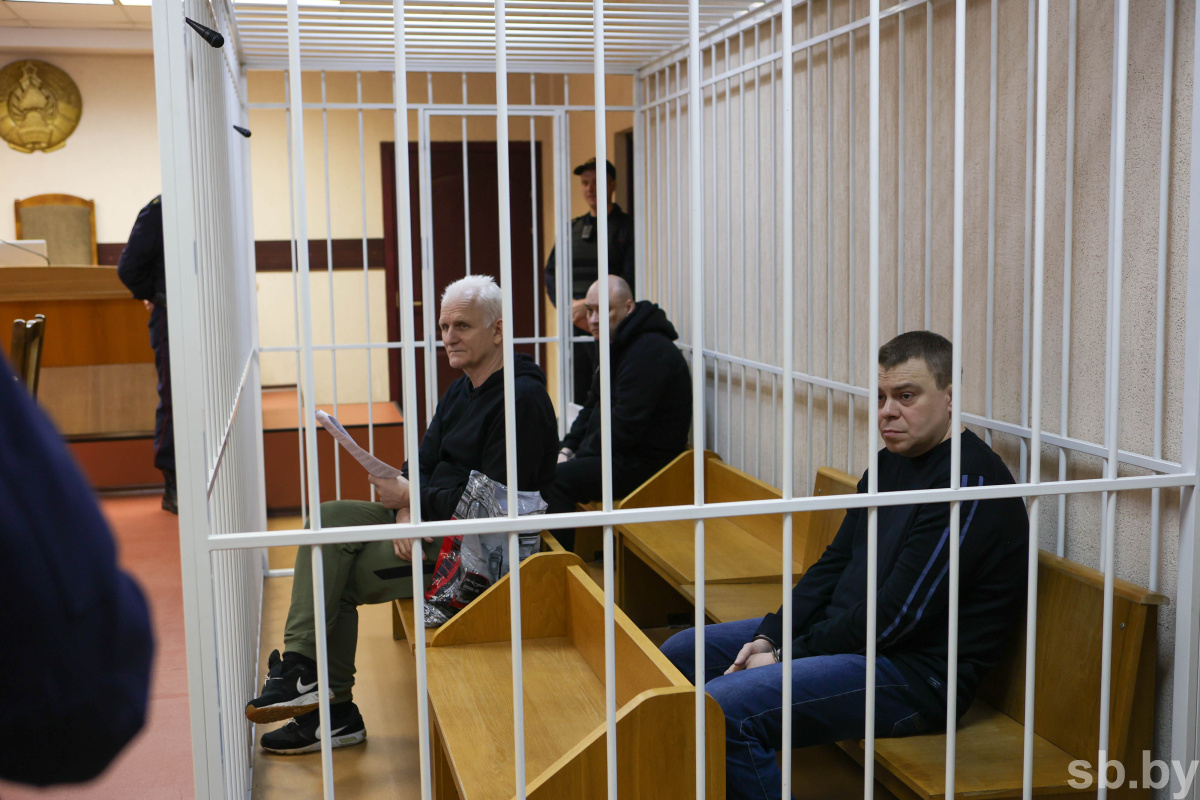
According to the prosecution, the human rights defenders, “acting as organized group, from April 4, 2016, to July 14, 2021, under the condition of being used on the territory of Belarus for illegal activities and financing of the Viasna Human Rights Center and other organizations, cashed out funds transferred by various entities and foundations to the bank accounts of the foreign organization controlled by them. Then, with the help of other persons, acting with the common intent, they ensured the illegal transportation of large amounts, cashed out in the territory of the Republic of Lithuania, across the customs border of the Eurasian Economic Union in the total amount of at least EUR 201,000 and USD 54,000 by transporting them piece by piece undeclared across the border. According to the case file, “they, together with other persons, deliberately prepared citizens for participation in group actions grossly disrupting public order, and financed and provided material support for such actions under the guise of human rights and charitable activities, including on behalf of the Viasna Human Rights Center and the unregistered BY_HELP foundation, from May 2020 to July 14, 2021.” In particular, the human rights activists were accused of paying fines, lawyers’ fees, and bills for food in detention centers.
Judge Maryna Zapasnik tried the case for almost two months in an open regime, with Aliaksandr Karol as the public prosecutor. Throughout the 22 court sessions, the human rights activists were kept in a cage in handcuffs, and the courtroom was locked from the inside. The trial was distinguished by increased “security measures”: a metal detector frame at the entrance to the courtroom, a lot of security officers in civilian clothes, and a separate list of those admitted to attend the trial.
After the first court session, Yekaterina Yanshina a journalist cooperating with the Russian Memorial Human Rights Centre, was detained. She was arrested for 15 days and then deported from Belarus and banned from entering the country for 10 years. Oleg Orlov, a co-chair of Memorial, who also attended the first day of the trial, was also banned from entering Belarus—he found that out at the Moscow airport when he wanted to fly to Belarus to attend the sentencing of the Viasna human rights defenders.
At the trial, Ales Bialiatski and his colleagues spoke Belarusian. Throughout the trial, the Nobel Peace Prize winner was trying to ensure that the court sessions were held in Belarusian. At the very beginning of the court session, the human rights defenders filed petitions for the trial to be conducted in the Belarusian language and the handcuffs to be removed, since wearing them humiliated their dignity. The judge dismissed the first petition and did not even consider the second one, since that was allegedly within the competence of the guards.
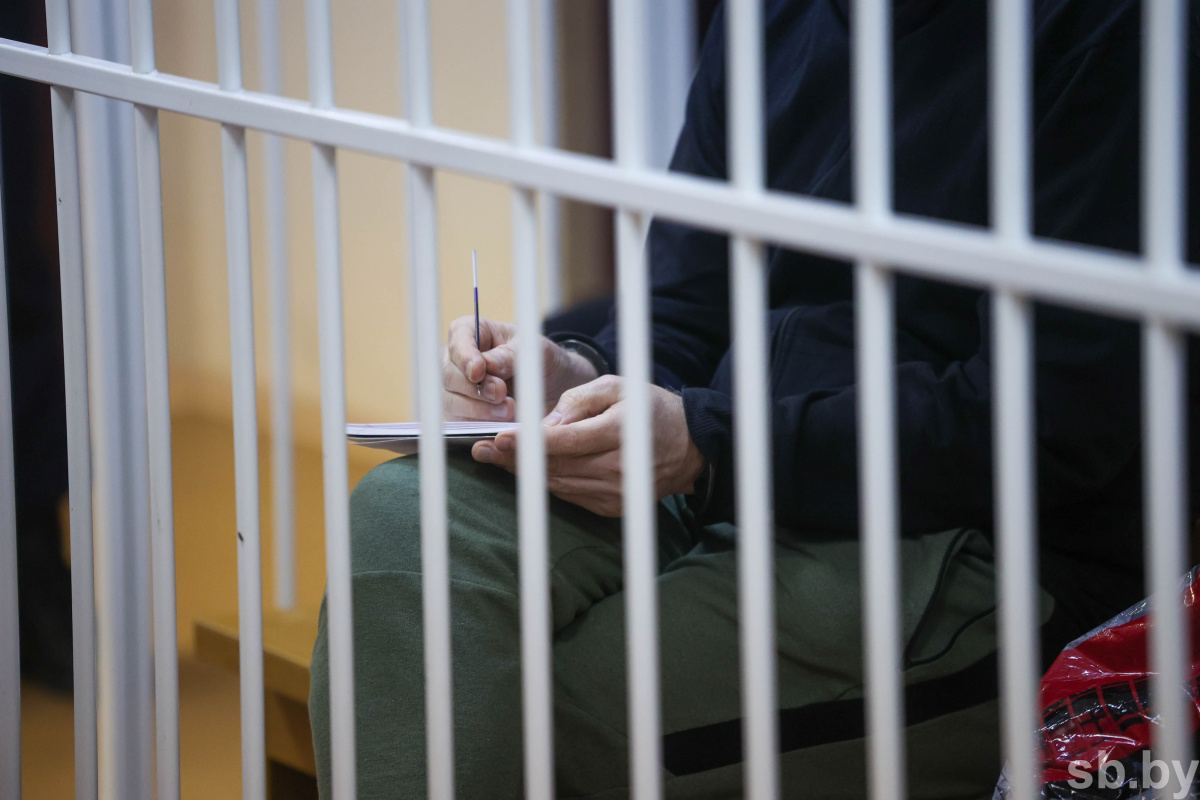
Then Ales Bialiatski made another request—to provide an interpreter in the Belarusian language, citing the fact that he did not speak Russian well enough. To this, the accused was told that he had read his case file in Russian, and no questions about understanding it arose. The court did not grant his request.
Ales Bialiatski expressed no confidence in Judge Maryna Zapasnik and challenged her. Expectedly, the petition was rejected.
Ales Bialiatski’s lawyer also filed a motion to change the preventive measure to non-custodial, citing the human rights defender’s cardiovascular disease as an argument. Prosecutor Aliaksandr Karol, in turn, said that “the case materials indicate that Bialiatski may abscond from justice”, and he “sees no reason to change his preventive measure”. Judge Maryna Zapasnik dismissed the motion.
The case file of the Viasna case consisted of 283 volumes of 300 pages each—a record volume among the political cases in Belarus. It contains a lot of information about the public activities of the human rights defenders published on the Viasna website and social networks even after the arrest of the accused. For example, the case filecontained the list of political prisoners, recognized as such by the human rights community as of September 3, 2022 (1,322 persons)—shortly before the final charges were presented and more than a year after the arrest of the Viasna human rights defenders. That part of the case file totaled 128 pages. Besides, the case file showed that the officers of GUBAZiIK (Interior Ministry’s Main Directorate for Combating Organized Crime and Corruption) had been shadowing the human rights defenders since September 2020, when they began wiretapping the phone of Uladzimir Vialichkin, the head of the Viasna branch in Brest. At the trial, it turned out that the GUBAZiIK employees wiretapped the political prisoner Leanid Sudalenka during his short meeting with his wife in remand prison #3 in Homieĺ, two months after his arrest.
At the beginning of the trial, Ales Bialiatski claimed that he had not have enough time to read through more than 70 volumes of the case file. He asked to be allowed to read them, but the judge stated that he had enough time for that—a month, and there was no reason to give the human rights defender additional time. There were about 100 witnesses in the case, but only a few of them were questioned at the trial. Besides, 120 searches were carried out throughout the country as part of the Viasna case.
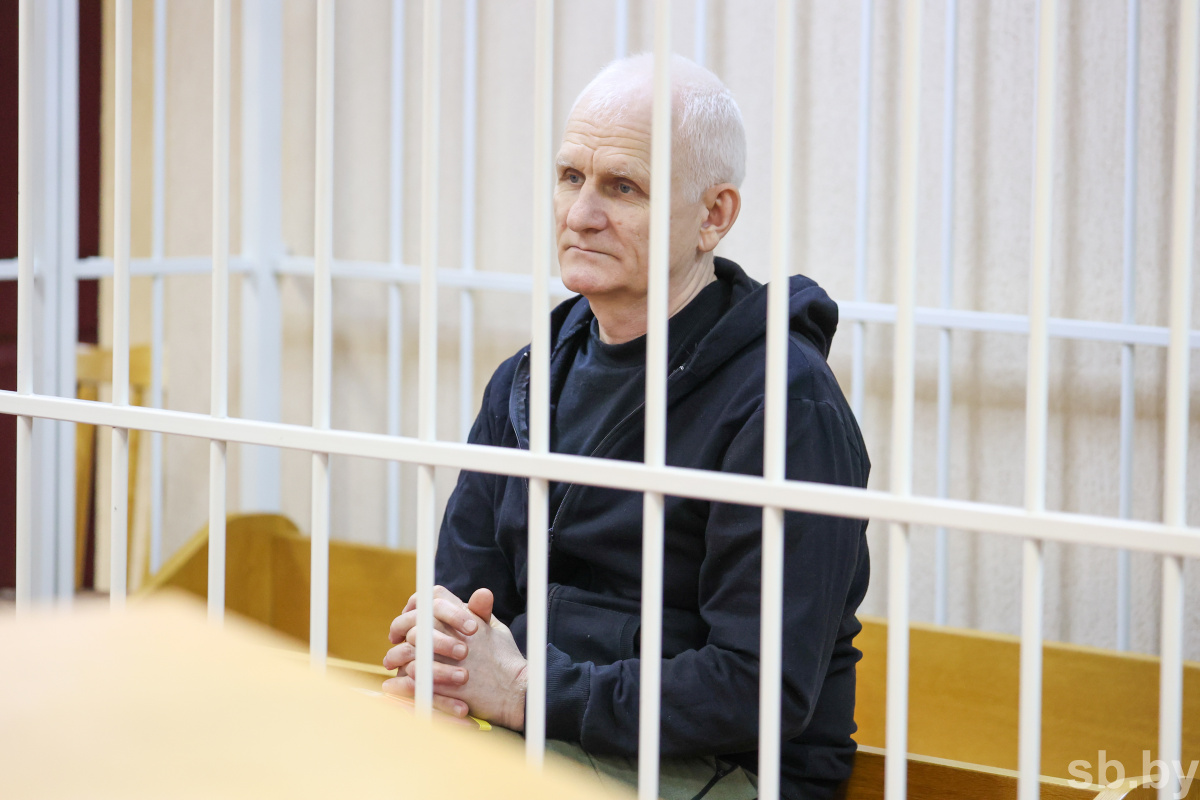
Ales Bialiatski pleaded not guilty. The human rights defenders testified during the trial. Here is how the chairman of Viasna commented on the case at one of the court sessions:
“The criminalization of assistance to victims of political repression, which unexpectedly occurred after May 2020, is immoral and inhumane. It is arbitrary because this article—Part 2 of Article 342 of the Criminal Code—has not been changed for many years. And suddenly, from May 2020, it began to be used against humanitarian aid to affected people.
It is a tradition of the Belarusian people to help those in trouble. But if the Criminal Code is interpreted in this way and applied against such charitable assistance to each other, it is inhumane. Until May 2020, for some reason, such assistance was possible, and after May it was banned.”
It became known from the case file that the Viasna chairman had had a penalty in the form of a reprimand. According to the reference provided by reman prison #1 in Minsk, “Ales Bialiatski needs to be under control.”
On February 9, 2023, judicial debates began, in which the prosecutor Aliaksandr Karol asked for 12 years in prison for Ales Bialiatski. This is the maximum punishment stipulated by the articles under which the human rights defenders were tried.
On February 13, 2023, the political prisoners made a strong final speech in Belarusian.
On the eve of the verdict, international human rights organizations issued a statement and repeated their calls for the release of the human rights defenders and the dropping of all charges against them. On the evening of March 2, actions of solidarity with the Viasna human rights defenders took place in the Polish cities of Warsaw and Gdańsk.
On March 3, 2023, Ales Bialiatski was sentenced to 10 years imprisonment in a medium-security penal colony and 5,000 base fines (185,000 Belarusian rubles, which is approx. $ 62,311). The other human rights defenders involved in the case were sentenced to 7 to 9 years in prison.
Not everyone willing could hear the announcement of the verdict since the courtroom was full of young men in civilian clothes. Those were probably cadets of the Internal Ministry’s Academy.
The harsh sentences against the human rights defenders caused indignation both among Belarusians and in the international community In many cities of the world, actions of solidarity with the political prisoners occurred.
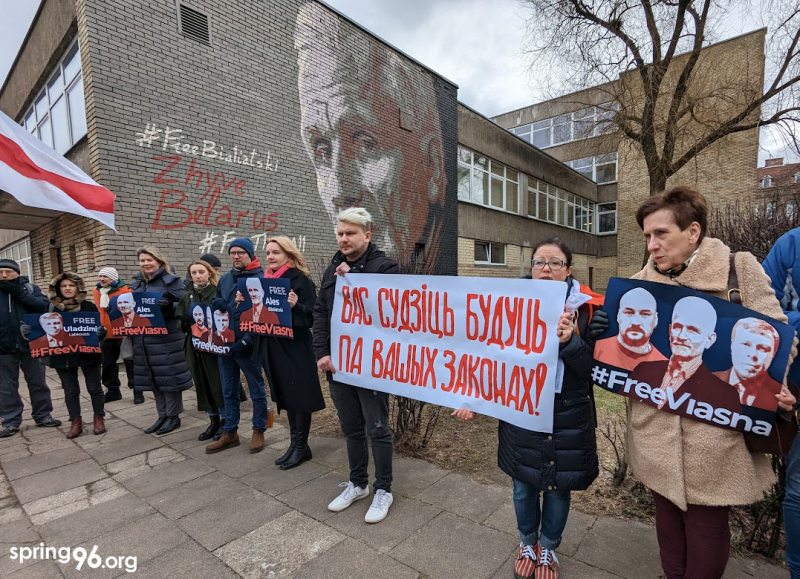
The last word of Ales Bialiatski in court
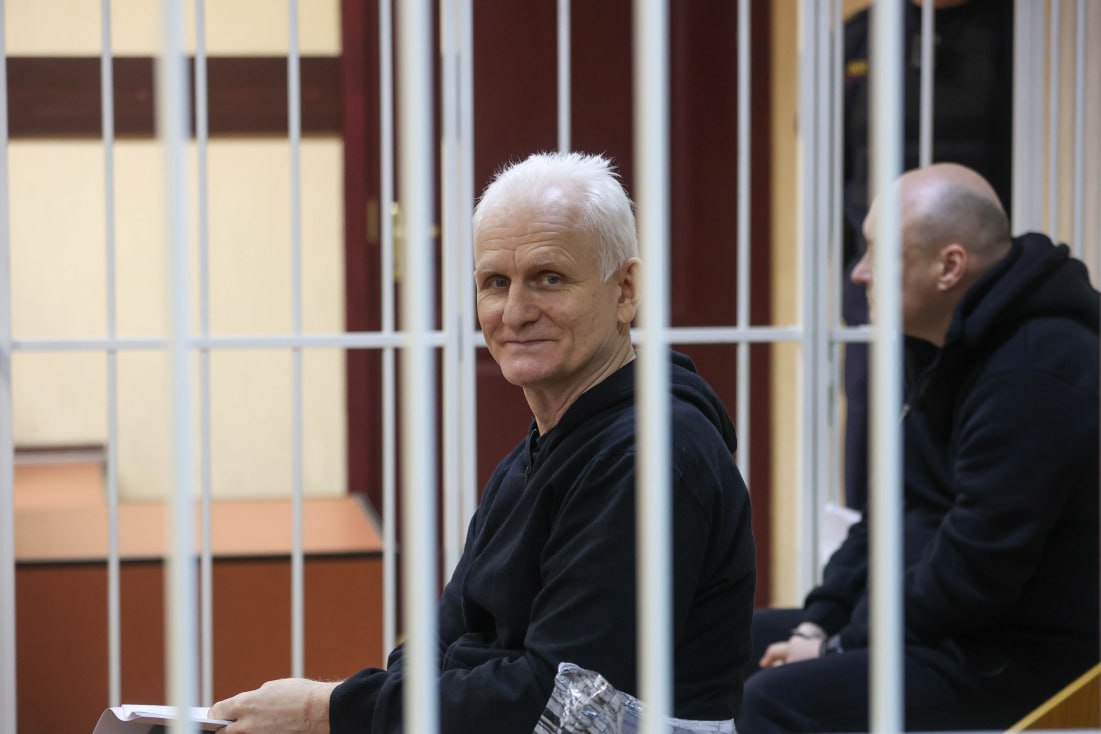
On February 13, 2023, Viasna human rights activists gave their last words in the Belarusian language. Here is a translation of the Nobel Peace Prize laureate's last word in court:
“The criminal case against us, human rights defenders of Viasna, is politically motivated. This whole saga of 284 volumes, hundreds of searches, and interrogations all over the country have nothing to do with the [real] preliminary investigation, plus political background.
And after that, there was no fair trial either. The investigation into the so-called criminal case lasted a year and a half. Of the four lawyers who defended me at various stages, one — Vital Brahinets, ended up in jail and was sentenced to eight years, two more were disbarred in recent months, and only one made it to the finish line. This unprecedented pressure on lawyers reveals the difficult and dangerous conditions under which they have to defend their clients.
Once we reviewed some volumes of the so-called criminal file, it became clear that the investigation pursued the goal that was set for them: to jail human rights defenders of Viasna at any cost, to destroy Viasna, and to stop our work. Only this can explain the sudden change of charges from ‘tax evasion’, which had lasted 13 months from the date of our arrest, to ‘smuggling by an organized criminal group’, [the latter] meaning Viasna. The authorities are obviously violating the international obligations they have undertaken to protect human rights defenders within the framework of the UN and OSCE Joint Agreements.
We should also note that during the investigation state media—various TV channels and the Belarus Today newspaper, funded by the Presidential Administration—presented their extremely negative value judgment of the Viasna human rights defenders. Thus, as early as last September, they claimed that human rights defenders had been distributing extremist materials and financing protests».
A separate set of all kinds of fake information, rumors, and lies was released in the last week and yesterday [February 12]. All this was actively broadcasted on state TV channels which accused us of various sins, which even the investigation and the prosecutor's office had not thought of. I see this as a violation of the presumption of innocence, and direct pressure on the court. We have not yet been convicted, but the state media are already calling us criminals.
The linguistic situation in court was extraordinary. The prosecution and the court categorically refused to speak Belarusian, despite the fact that I, as a defendant, am a Belarusian-speaking person. I speak, write, and think in Belarusian. I remind you that the Belarusian language is the state language, and you, as state officials, must speak the two state languages, including Belarusian, not mumble-jumble. Therefore, you are obliged to speak Belarusian to Belarusian-speaking citizens. For example, the Law ‘On citizens' appeals’ provides that if one writes in Belarusian, then any deskbound official answers you in Belarusian. Thus, they put me in an unequal position with the prosecution. I was not given the opportunity to explain my position thoroughly and in detail, to challenge the unfair and senseless accusation.
The prosecution and the court practically refused to hear me, to ask me the questions they were interested in during the trial and my hearing. It seems that neither the prosecutor's office nor the court was interested in the truth at all—for them everything was clear from the very beginning, even before the trial. I would like to remind you that neither the prosecutor's office nor the court gave me the opportunity to review all 284 volumes of the so-called criminal file.
The political underpinning of criminal proceedings against Viasna human rights defenders is also evidenced by the overall situation in the country, permeated with mass repression and total human rights violations during and after the election campaign in 2020. Instead of hearing the voice of the people, a violent reaction took place in Belarus. A clearly political decision of the authorities was to crush the civil society in Belarus and destroy it. Independent journalists and bloggers, analysts and political scientists, independent trade union activists, political parties and movements' leaders and activists, presidential election teams members and the candidates themselves, national culture figures, writers, musicians, artists, teachers and students, athletes, ordinary protesters, and just random people were exposed to the machinery of repression. There are now 1,500 political prisoners in the country. Hundreds had already been through jail in the last two and a half years and were released after their punishment was over. Tens of thousands of peaceful activists were arrested and sentenced in administrative proceedings. It is not surprising that in this time, when human rights in Belarus went down the tubes, human rights defenders are also among those jailed. These include the coordinator of the Viasna Volunteer Service Marfa Rabkova, volunteer Andrei Chapiuk, Homieĺ human rights defender Leanid Sudalenka, volunteer Tatsiana Lasitsa, and other volunteers who helped the victims of mass repression.
Repression in the country continues today. This is indicated by more and more new political prisoners, who appear in pre-trial detention facilities. For example, human rights defender Nasta Loika. was recently arrested. There is a series of trials in politically motivated criminal cases. This level of repression, of all sorts of pressure on society by the authorities, is unbelievable, unimaginable, and unprecedented! It was only in the dark years of the Russian Empire and under Stalin's rule until his death in 1953 that something like this was happening in our history. At the beginning of the 1980s, at the height of the Soviet Union's crackdown on dissidents, human rights activists, activists of national and religious movements, there were about three thousand political prisoners in the entire Soviet empire with its vast population of 250 million people. Now there are 1,500 political prisoners in Belarus alone.
I am convinced that the government's current policy of total control of society and the brutal suppression of dissent, the total rejection of pluralism of thought, and reorganizing the state into a totalitarian society modeled after the Soviet Union of the 1970s is totally unpromising. The world is moving forward into a post-industrial era. A new generation and millions of Belarusians, who have civilizational values different from those of the Soviet epoch, have already grown up. They do not want to live in Soviet barracks. They won’t be content with just a crust of bread sprinkled with water and sugar or fried lard. They want and demand that their voice be heard, considered, and counted. They want to live in an economically developed, democratic, and independent Belarus.
The events of 2020, the mass protests against the manipulation of election results, against human rights violations, clearly showed that better than any opinion poll. For many people, these events were a surprise, and for the authorities, it was an unpleasant surprise. We must admit that society and people in the country are strongly divided biologically, value-wise, and mentally, but those who live in society can see that this division is based on age, place of residence, and level of education, although there is nothing surprising and unique in this. Societies are heterogeneous all over the world. They include different people of different views, their interests are represented by political parties, and truly fair elections make it possible to treat the authorities with more or less certain trust. The division of Belarusian society is not fatal. Both society and the state can live with it, but one should be clearly aware of its existence, instead of turning a blind eye and building a cozy world for oneself the way some would like to.
Millions of Belarusians think, reason, and—after all—live one way, and millions of others do it another way. And today it doesn't matter who outnumbers whom. There are millions on both sides. It is important to understand that this social division will be with us for a long time. All of us—the entire Belarusian society, no matter what our views and convictions—will have to live with this division for a long time. The path of confrontation, where one side—the security services, the prosecutor's office, the investigators, the courts—pushes forward and suppresses the other side, is dangerous and unpromising. It leads nowhere. The history of Latin America in the 20th century—Chile, Argentina, Haiti, and others—confirms this. Banana Republic juntas, dictatorships have no prospects for any lasting life and development. The result of this policy of intolerance, confrontation, and total rejection of political pluralism is a constant socio-political, social, and economic crisis, and mass migration. All of this is tightly knotted together.
The situation of a full-scale crisis in the state puts the sovereignty of Belarus in jeopardy. We face huge geopolitical challenges, and the country has come to a dead end. As our ancestors said: “From this trap net, there is no going back, no going forward”. The only possible way out of the all-around crisis in which Belarus is caught up appears to be a constant long-term search for a consensus, a balance in society, taking into account the interests of different strata of society. In order to preserve Belarus as a state, for the sake of the future of our people, all of us, and first of all the authorities, must show wisdom and foresight. I recall an appeal we, the Human Rights Center Viasna, made on the eve of the 2020 election and which was published on our website and in other media outlets. We urged the authorities not to use violence against peaceful demonstrators. They used, and what did it end with?
It is necessary to start a broad public dialogue aimed at national reconciliation, no matter how hard it may seem to go. It must be preceded by the release of all political prisoners, a broad amnesty—and an end to repression, as there is no point in an amnesty if people are released with one hand and put in jail with the other. Both the authorities and representatives of the general public, political parties and movements, those who are now in prison, and those who are fleeing the repression and have been forced to go abroad should take part in such a dialogue. It is a feasible proposal, as long as there is a desire and political will to do so. The socio-political crisis in Belarus is not unique. Right now, other countries in various corners of the world struggle to overcome similar crises: Kazakhstan, Venezuela, and even Iran.
We have to clearly realize that it is better to hold tough negotiations and gradually get out of the crisis than to fall into a reckless confrontation, which can lead to very serious consequences: poverty and misery, violence and injustice—which will ruin Belarus. If we think of Belarus as our common homeland, where there is room for everyone, regardless of different political views and geopolitical preferences; if we do not want to plunge the country into poverty; if we do not want mass migration out of Belarus in search of a better life; if we want to get a chance for economic, social, political, ecological development of our people—we must start this national dialogue! Enough is enough, we must stop this civil war. I hope that my words will be heard.”
Nobel speech
On December 10, 2022, Bialiatski's wife Natallia Pinchuk received the Nobel Peace Prize in Oslo on behalf of the Viasna chairman. On this day, for the first time in the history of the Nobel Prize, the Nobel speech was delivered in Belarusian.
“Your Royal Graces, Your Royal Highnesses, dear members of the Nobel Committee, dear ladies and gentlemen.
It is with great excitement that I have the honor to speak here, at the honoring of the 2022 Peace Prize laureates. My husband Ales Bialiatski is among them.
Unfortunately, he cannot accept his award in person. He is behind bars in Belarus. That is why I am standing here.
I would like to express my gratitude:
to the Norwegian Nobel Committee, whose decision has strengthened Ales in his willingness to stand in his truth and gives hope to all Belarusians that they can count on democratic solidarity in the struggle for their rights.
Thanks to everyone who supported Ales, his friends and his cause all these years, and supports now.
I sincerely congratulate the Center for Civil Liberties and the Memorial International Society on the well-deserved award. Ales and all of us are aware of how important and risky it is to carry out the mission of human rights defenders, especially in the tragic time of Russia’s aggression against Ukraine.
Not only Ales is in prison — thousands of Belarusians, tens of thousands of repressed people, imprisoned for their civil position are there. Hundreds of thousands are forced to flee the country just because they wanted to live in a democratic state. In Belarus, unfortunately, the war of the authorities against their own people, language, history, and democratic values has been going on for years. I speak about this here with pain and apprehension, because today’s political and military events threaten Belarus with the loss of its statehood and independence.
Unfortunately, the government communicates with the society only with the help of force — grenades, batons, stun guns, endless arrests and torture. There is no talk of national compromise or dialogue. They persecute girls and boys, women and men, minors and the elderly. The inhuman face of the system reigns in the Belarusian prisons, especially for those who dreamed of being free people!
In this situation, it is no coincidence that the authorities arrested Ales and his associates from the Human Rights Center Viasna for their democratic beliefs and human rights activities: Marfa Rabkova, Valiantsin Stefanovich, Uladzimir Labkovich, Leanid Sudalenka, Andrei Chapiuk and other human rights defenders are in prison. Others are still under investigation and prosecutor’s charges, or had to flee abroad. But “none can conquer, stay or halt” the Human Rights Center Viasna-96, created more than twenty-five years ago by Ales and his like-minded people!
Ales could not hand over the text of his speech, he managed to tell me literally a couple of words. Therefore, I will share his thoughts with you — both the latest ones and those recorded earlier. These are fragments of his earlier statements, works, and reflections. Here are his thoughts about the past and future of Belarus, about human rights, about the destinies of peace and freedom.
I am passing the floor to Ales.
“It so happens that the people who value freedom the most are often deprived of it. I remember my friends — human rights defenders from Cuba, Azerbaijan, Uzbekistan, I remember my spiritual sister Nasrin Sotoudeh from Iran. I admire Cardinal Joseph Zen from Hong Kong. Now in Belarus, thousands of people are behind bars for political reasons, and they are all my brothers and sisters. Nothing can stop people’s thirst for freedom. The whole of Belarus is here in prison now. Journalists, political scientists, trade union leaders, and many of them are my acquaintances and friends... The courts are working like a conveyor belt, the convicts are transported to the colonies, and new waves of political prisoners take their place...
This award belongs to all my friends, human rights defenders, all social activists, tens of thousands of Belarusians who were beaten, tortured, arrested, and imprisoned. This award is a reward for millions of Belarusian citizens who stood up for their civil rights. It emphasizes the dramatic situation of human rights in the country.
I recently had a short dialogue.
“When will you be free?” they asked me.
“I’m free at heart anyway,” I answered.
My free spirit soars over the prison and over the maple leaf contours of Belarus.
I look inside myself, and it seems that my ideals have not changed, have not lost their value, have not faded. They are always with me and I protect them as best I can. They are like cast gold, and they do not rust.
We want to make our society more harmonious, fair and responsive. To achieve an independent, democratic Belarus. We want her to be cozy and attractive to live in. This idea is noble, consistent with the world’s general ideas of civilization. We don’t dream of something extraordinary, we just want to “be called people”, as our classic Yanka Kupala said. It implies respect for ourselves and others, human rights, a democratic way of life, the Belarusian language and our history.
I believe because I know that the night will pass and the morning will come. I know that it is hope and dream that tirelessly push us forward.
Martin Luther King paid with his life for his dream, he was shot. My fee for my dream is lower, but I still have to pay for it. I don’t regret it a bit. Because my dream is worth it. My ideals are consistent with the ideals of my older friends and spiritual teachers, the Czech Vaclav Havel and the Belarusian Vasil Bykau. Both of them went through great life trials, both did a lot for their peoples and culture, both fought for democracy and human rights until the last minutes of their lives.
It is impossible for a good crop to grow immediately on an empty field. The field must be fertilized well, the stones must be removed... And what the communist government left in Belarus after the 70 years of their rule can be called scorched earth... There were times in the late 1980s when we literally all knew each other by sight... But at the beginning of the 1990s, thousands and tens of thousands of people appeared...
On August 9, 2020, the presidential elections were held in Belarus. The mass falsifications made people take to the streets. The Good and Evil met in a fight. The Evil was well armed. And on the part of the Good there were only unheard-of peaceful mass protests gathering hundreds of thousands of people.
The authorities fully launched the repressive mechanism of torture and murder having killed Raman Bandarenka, Vitold Ashurak, and many others. This is the highest level of repression unprecedented in its brutality. People are going through unimaginable torture and suffering.
The cells and prisons look more like the Soviet public toilets, in which people are kept for months and years. I am absolutely against the fact that women are in prison. Imagine what they go through in the prisons of Belarus, in this branch of hell on earth!
Lukashenka’s statements confirm that the performers were given carte blanche to stop people through fear. But citizens of Belarus demand justice. They demand that those who committed mass crimes be punished. They demand free elections. Belarus and Belarusian society will never be the same again, as when they were completely bound hand and foot. People have woken up...
Now the permanent struggle between the Good and Evil has unfolded almost in its purest form in the entire region. The icy cold from the East collided with the warmth of the European Renaissance.
It is not enough to be educated and democratic, it is not enough to be humane and merciful. You need to be able to defend your gainings and your Motherland. It is not for nothing that in the Middle Ages the concept of the Fatherland was identical to the concept of freedom.
I know exactly what kind of Ukraine would satisfy Russia and Putin — a non-independent dictatorship. Such as today’s Belarus, where the voice of the oppressed people is not heard.
The Russian military bases, huge economic dependence, cultural and linguistic Russification — this is the answer to the question of whose part Lukashenka is on. The authorities of Belarus are independent only to the extent that Putin allows them. And that is why it is necessary to fight against the “international of dictatorships”.
I am a human rights defender and therefore a supporter of non-violent resistance. I am not an aggressive person by nature, I always try to behave that way. However, I also understand well that the good and the truth must be able to defend themselves. I keep peace in my soul as best I can, nurture it like a delicate flower, drive away anger. I pray that reality will not force me to dig up a long-buried ax and defend the truth with an ax in hand. Peace. May peace remain in my soul.
And on December 10, I want to repeat to everyone: “Have no fear!” This is what Pope John Paul II said in the 1980s when he came to the communist Poland. He didn’t say anything else then, but that was enough. I believe because I know that spring always comes after winter.”
I have quoted Ales Bialiatski. And I will end my speech with shouts from his soul: Freedom to the Belarusian people! Freedom to Viasna! LONG LIVE BELARUS!”
Release
On December 13, 123 political prisoners were released under a pardon, including the head and founder of Viasna, Ales Bialiatski. He had been held behind bars for four years and five months. The pardon took place with the assistance of the U.S. government. Immediately after his release from the penal colony, Ales was forcibly taken to Lithuania.
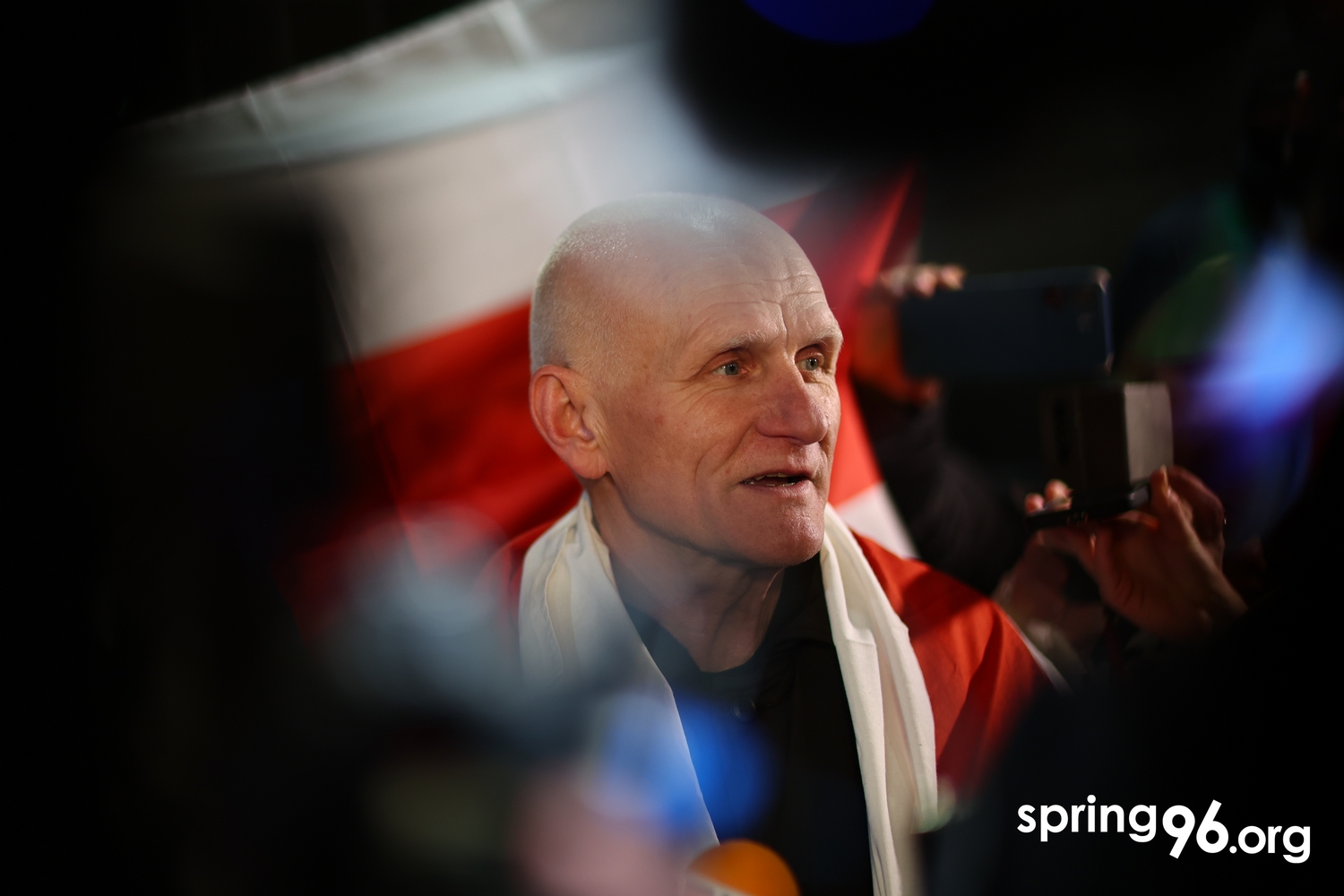
“In the morning — deep at night — I was in prison. I was there in completely different conditions, lying on bunks in a room with almost 40 people. And now I am free. Of course, considering that I spent almost four years in such conditions, my feelings are still not entirely clear.
My colleague, Valiantsin Stefanovic, remains imprisoned despite my release. Therefore, our struggle continues. It is very important for everyone to keep their focus on those political prisoners who are still in Belarusian prisons and to strive for the full release of all of them, so that not a single political prisoner remains there,” Ales said after his release.
